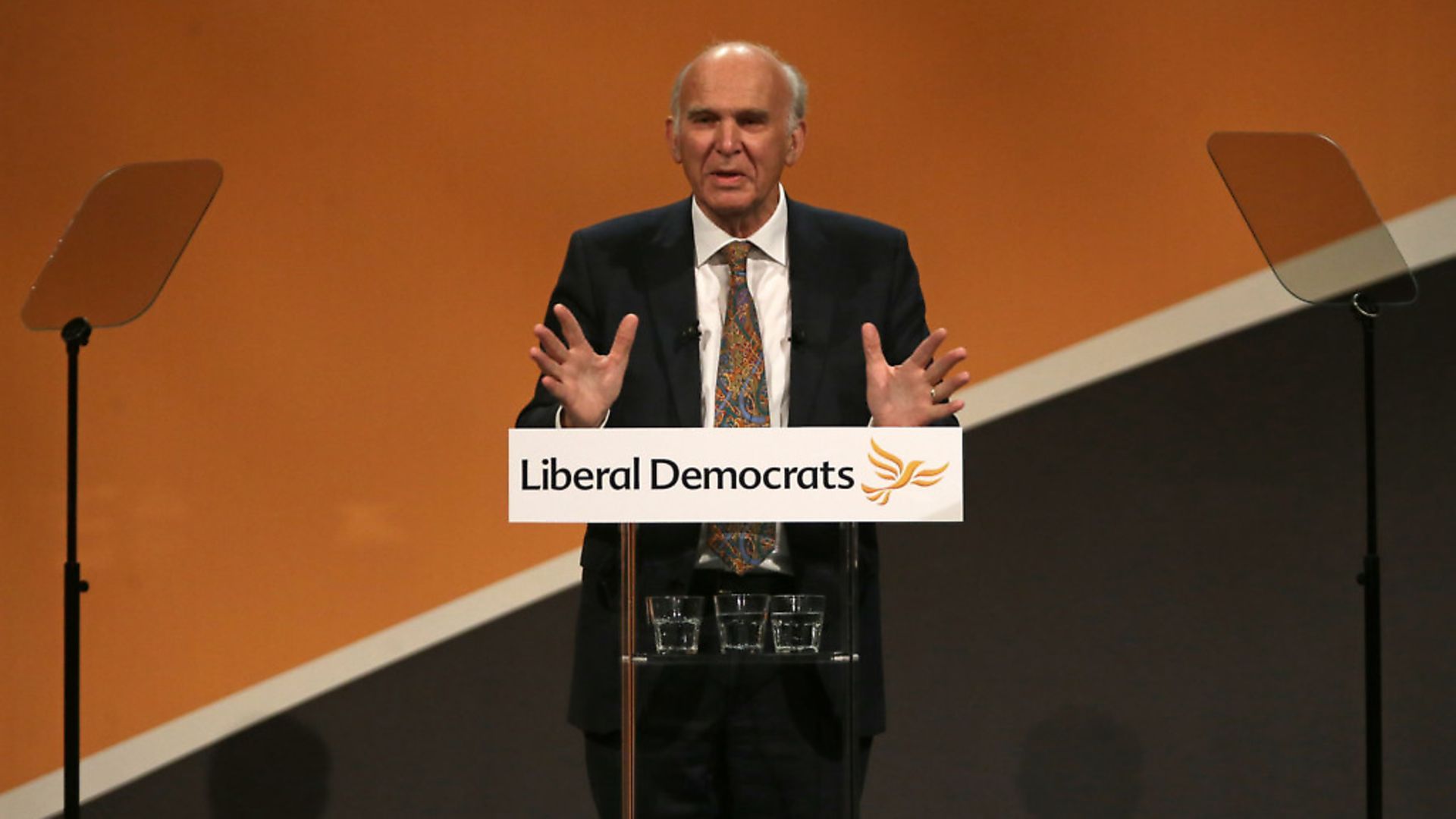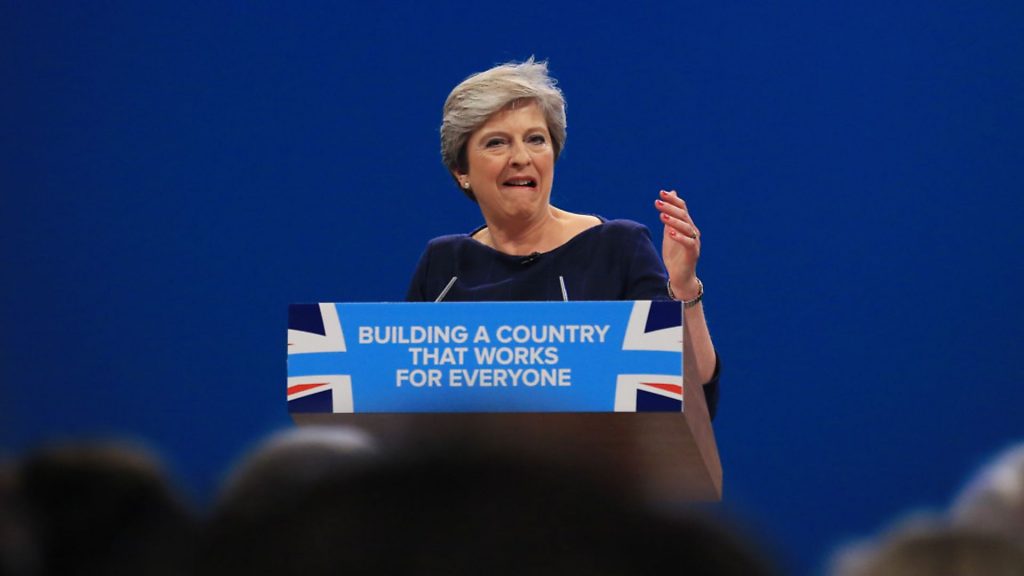
As conference season looms one party has the chance to seize the initiative, says JANE MERRICK, as she outlines why their annual gathering is vital for the Lib Dems

There are signs, however subtle, that autumn is just around the corner: it gets dark before 9pm, the horse chestnuts are fattening on the trees and, from their far-flung sun-loungers and staycation Airbnbs, MPs are turning their minds to conference season.
The annual party gatherings for the main political parties are always eventful. But this year, it is the last conference season before Brexit, and, as such, it could be the most dramatic for years.
The two main political parties are at a crossroads, their futures in question over Brexit and much more besides. When the Conservatives meet in Birmingham at the end of next month, Jeremy Wright, the culture secretary, plans to make his speech as a hologram, but by the end of the week it could be the prime minister wishing she was not there in person. After she fell foul of a bad cough, a P45-wielding heckler and a collapsing set last year, Theresa May needs to deliver a closing speech authoritative enough to win over her critics. This year, with her Chequers plan for Brexit opposed by Eurosceptic MPs, the stakes are even higher.
When the conference starts on September 30, she will have just returned from a summit with fellow EU leaders in Austria with what she hopes will be broad support for the Chequers proposal. Yet at the weekend, Jacob Rees-Mogg, the leader of the European Research Group of Tory MPs, said the PM would find it ‘extraordinarily difficult’ to deliver the plan as it stands, as it maintains some alignment with the EU after departure and is reportedly opposed by up to 100 Conservative MPs.
His comments represent a hardening of his position on Chequers and May herself. In an interview with The Sunday Times, Rees-Mogg said Chequers was ‘half in, half out’, and therefore did not square with the ‘promises’ she made at the last election. Unless she changed it ‘she will find she has a block of votes against her in the House of Commons’, the MP said. The votes in parliament on a deal will come later in the autumn, but Brexiteer Tories will want to see some movement on Chequers by the time the prime minister takes to the stage in Birmingham in early October.
Yet if she capitulates to her Eurosceptic wing and proposes a Brexit closer to the ‘Canada-plus’ option favoured by Rees-Mogg, under which the UK would have no customs arrangements with the EU, remain-supporting Conservatives will mobilise against the plan in the Commons. These MPs, led by Anna Soubry, Dominic Grieve and Nicky Morgan, have no standout candidate for a leadership challenge – unlike Boris Johnson or Rees-Mogg on the Brexiteer side – but they pose a more potent threat, in parliamentary terms, because opposition MPs are more likely to block a Canada-plus deal.
The prospect of Johnson overshadowing May’s performance at party conference has become an annual fixture, but this year the former foreign secretary has become a looser cannon than ever before. No longer a member of the cabinet, Johnson will not be speaking from the stage in the main conference hall, but Tory chiefs are concerned this will make him more unpredictable and uncontrollable from the fringe, where he will be unfettered by party management. Ongoing disciplinary proceedings against Johnson over his comments on the burka earlier this month have hardened his supporters against May, Downing Street and Tory chairman Brandon Lewis, whose demands for an apology from the MP for Uxbridge were rebuffed.
The prime minister’s weakness over Brexit has drained her authority in other areas, therefore. But she is not the only party leader in such a position. Jeremy Corbyn will have no problems with popularity among activists at Labour’s conference in Liverpool, where there will be few challenges to his policy agenda from the fringe or the main stage. But he has, nevertheless, brought his party to a crossroads over anti-Semitism and Brexit, which has left some moderate MPs wondering how long they can stay with Labour. The most pressing issue is the ongoing row over anti-Semitism, intensified by Labour’s ruling national executive’s refusal to adopt the full definition set out by the International Holocaust Remembrance Alliance. There are hopes that the specific IHRA matter will be settled at the NEC meeting on September 4, with suggestions that the party is inching towards accepting the definition, but the strength of feeling on the broader issue of anti-Semitism, particularly the treatment of Margaret Hodge, means it will certainly dominate proceedings in Liverpool later in the month.
A separate problem for Corbyn, but one which has a similar potential to split the Labour Party, is his position on Brexit. Although the party’s policy, under shadow Brexit secretary Keir Starmer, is fairly tough – insisting that the government’s Brexit deal must meet six tests before it gets Labour backing – Corbyn’s personal views are far more Eurosceptic. The Labour leader has equivocated on what UK departure should look like, and has refused to back a People’s Vote on the final deal, instead arguing for another snap election. For Corbyn, equivocation on Brexit served the party well at last year’s election, because neither Leave supporters in working class Labour areas nor Remain voters in metropolitan constituencies were offended enough by his Brexit position to desert the party. Yet for pro-EU Labour MPs and peers, the future of the nation and the party is at stake – and they want Corbyn to show clearer opposition to May’s Brexit plans at party conference. Regardless of Starmer’s six tests, it is the leader’s words which carry weight in the wider country.
Fascinatingly, a YouGov poll commissioned by Best for Britain and Hope not Hate of more than 4,900 people this week shows electoral support for Labour would dramatically improve if the party adopted a more robustly anti-Brexit position. The Conservatives would be ahead of Labour by nine points if Corbyn’s party went along with Brexit, but this margin narrows to four points if Labour oppose EU departure.
The question for both Labour and Conservative MPs, as they prepare for their respective party conferences next month, is whether their own personal positions on Brexit – and, in turn, how they see the future of the UK – trump party loyalties. Divisions over EU membership in both parties pre-date the 2016 referendum, but with decisions over what exactly Brexit will look like looming in the next few weeks, those divisions will be at their most stark over party conference season.
With both parties in turmoil over Brexit, there is a window of opportunity opening up for the Liberal Democrats. Vince Cable’s party gets to go first in the conference calendar and, unlike the rest of the year, receives a parity of broadcast and print coverage with the larger parties for one week only. When the Lib Dems gather in Brighton, they should seize this opportunity as if an election were being held at the end of the month. That same YouGov poll offered some tantalising numbers for Lib Dem strategists to ponder: the slump in support for Labour if they backed Brexit would directly benefit Cable’s party, with Labour on 19% and the Lib Dems leaping 10 points to 17%. The last local elections in May showed that the Lib Dems can translate their anti-Brexit position into votes – they won support in strongly remain areas, with a net gain of 40 council seats, a bigger increase than any other party.
The challenge for the Lib Dems is not unity or clarity inside the party on their Brexit position, but making sure the rest of the country knows it. Most importantly, the party should ensure its staunchly pro-Remain position is amplified every time Cable or any other senior Lib Dem does a television, radio or newspaper interview. The leader’s speech should be about fighting Brexit and little else. The message will – and should – become repetitive to Lib Dem members in the conference hall, but that doesn’t matter, because those members are not about to jump ship and join the chaos of Labour or the Conservatives. Repetition is the only way to get the Lib Dem message through to the wider electorate.
In his speech, Cable, who has come out in support of a People’s Vote, should appeal to disaffected Labour and Tory remain voters to join his party – adding weight to the growing calls for a People’s Vote. Crucially, the Lib Dems must not allow themselves to get distracted by bizarre policies or leadership speculation, problems that have thrown previous Lib Dem conferences off course.
A row is brewing among activists over the party’s new immigration policy paper, which has the potential to overshadow Cable’s week in Brighton. This policy paper, and a corresponding motion to be voted on at conference, declares the party’s backing for immigration but has been criticised for watering this down with caveats. Caron Lindsay, the editor of the influential Liberal Democrat Voice website, has described the paper as ‘apologetic, timid and half-hearted’. This simmering row must be headed off by Lib Dem chiefs before the party descends on Brighton, or else their big chance will be missed.
Labour is not about to throw its full weight behind a hard Brexit, but Corbyn’s equivocation offers the Lib Dems a real opportunity next month to present itself to the country as the only UK-wide party willing to stop Brexit.









